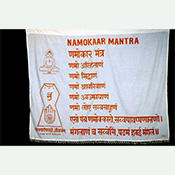 The Namaskara Mantra, a series of five salutations to beings honored in the Jain tradition, is offered at many religious occasions. It is repeated morning and night and remembered at the time of death.
The Namaskara Mantra, a series of five salutations to beings honored in the Jain tradition, is offered at many religious occasions. It is repeated morning and night and remembered at the time of death.
View full album
With the words “Namo Arihantanam . . .” begins the Jains’ most widely known recitation of praise. It means “Praise to the arihantas,” who are, literally, those who are “worthy ones,” or those who have “conquered enemies.” This especially means the inner enemies of anger, greed, deceit, and egotism that most obstruct the path of spiritual life. The jinas or tirthankaras are the great arihantas. Jains learn the Namaskara Mantra in childhood, repeat it morning and night, and remember it at the time of death.
Praise to the arihantas, the perfected souls.
Praise to the siddhas, the liberated souls.
Praise to the acharyas, our spiritual leaders.
Praise to the upadhyayas, our holy teachers.
Praise to all sadhus in the world.
This five-fold praise
Destroys all sin
And of all auspicious things
Is the foremost auspicious thing.
This Namaskara Mantra of five salutations is recited by Jains in individual devotions, as a prayer in the temple, as a blessing on daily activities, special occasions, and meetings. It is more than praise offered to these beings, for any Jain will insist that they do not need our praise, and that those who have attained luminous self-realization cannot even hear it. So they are not praises to, but praises of —giving honor to those who have started on the path toward freedom by taking a life of renunciation, to the various teachers, and finally to the liberated souls. As one Jain put it, “In praising, we ourselves are reminded of the qualities we honor, and we ourselves are changed.”